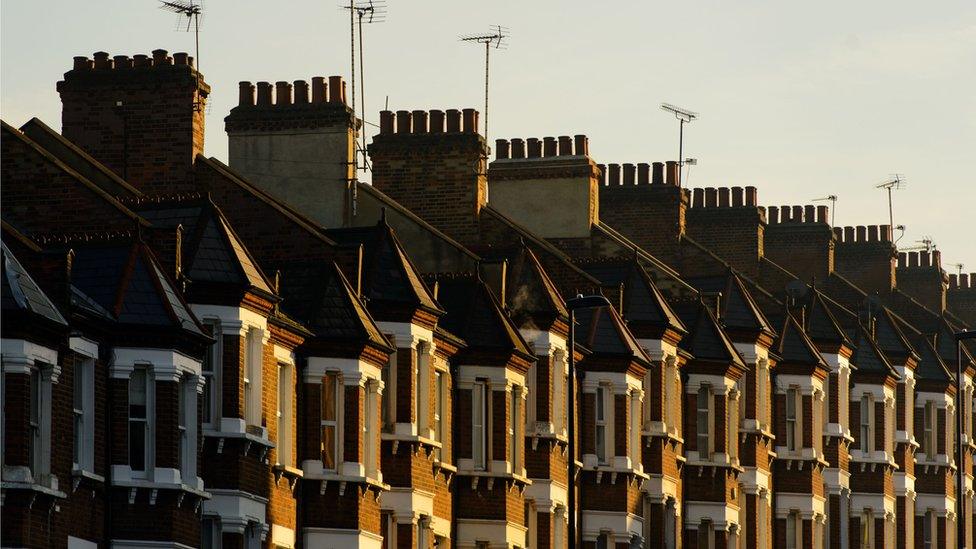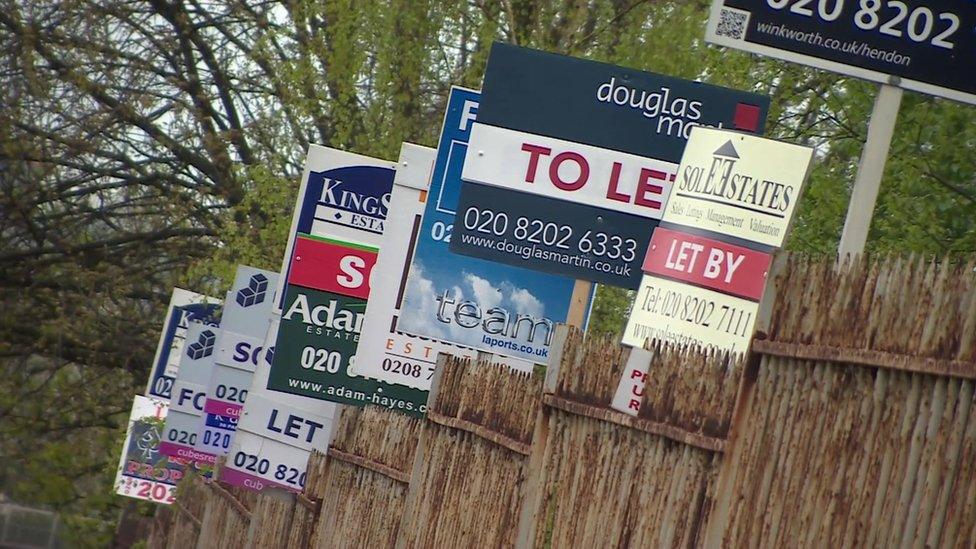Shelter says 227,000 'no fault' evictions in three years is appalling
- Published

Some 227,000 private renters in England have been served a "no fault" eviction notice in the past three years, a YouGov poll has suggested.
Homelessness charity Shelter wants the government to scrap these evictions, saying losing a private tenancy is the second biggest cause of homelessness.
A Section 21 "no fault" eviction notice means a landlord does not need to give a reason for ending a tenancy.
The government has said it plans to ban the practice "as soon as possible".
Shelter's CEO has described the situation as "appalling".
"Millions of private renters are living in limbo - never truly able to settle - in case their landlord kicks them out on a whim," said Polly Neate.
Shelter is asking the government to use the Queen's speech next month to honour its pledge to deliver a Renters Reform bill - including banning Section 21 no fault evictions.
The government committed to ending unfair evictions, external in April 2019 - outlining plans to abolish Section 21 evictions.
A government spokesperson said its Private Rented Sector White Paper would set out reforms, including banning Section 21 no fault evictions, "as soon as possible".
It is providing £22bn to help households with rising living costs, they said, which included putting an average of "£1,000 more per year into the pockets of working families" through Universal Credit and "direct support with bills".
An eviction ban put in place during the coronavirus pandemic for 14 months ended in May 2021.

'I'm worried and can't sleep'
Anna, 44, says she was given a Section 21 notice by her letting agent in March - after requesting repairs to her rented property in Manchester.
"As a tenant, you have no right to say anything," she says. "I'm being kicked out of my home of 15 years for complaining, after getting nowhere trying to get problems in the property fixed."
The part-time worker lives with her adult daughter. She says they have always paid rent on time but are struggling to find a new place to live because of letting agents' requirements.
"If we can't rent somewhere else, then it leaves us with no other option but the streets," Anna says. "I'm worried, can't sleep and don't feel I can cry anymore.
"Landlords have all the power, and this isn't right. There are plenty of people in a similar situation to me, and the government isn't doing enough to help us."

A Section 21 eviction notice gives tenants two months to move out and the landlord does not have to provide a reason for eviction.
The YouGov poll has also suggested a quarter of private renters, 2.8 million people, have had three or more rented homes in the past five years.
With one in five renting households being families with children, Shelter said it was concerned about the destabilising impact on children of constantly having to move.
Ms Neate said: "It's appalling that every seven minutes another private renter is slapped with a no-fault eviction notice despite the government promising to scrap these grossly unfair evictions three years ago."
The government must introduce a "Renters Reform Bill" that banned no fault evictions "to give private renters stability during a time of deep uncertainty", she added.
"With inflation and bills skyrocketing, renters desperately need a secure home as many will struggle to stump up the costs of having to move unexpectedly."
New rules were introduced in Scotland in 2017, requiring landlords to give a reason for ending tenancies.
In Wales, legislation was passed in 2021 to extend the amount of notice landlords had to give from two to six months.
Legislation to extend the notice period for tenancies is currently going through the Northern Ireland Assembly.
The National Residential Landlords Association, which represents 95,000 landlords across the UK, said Section 21 eviction notices would need to be "replaced by a system that is both fair and workable for both tenants and landlords".
It said it had published "detailed plans" for a new system and urged Shelter to work with them.

- Published30 November 2021

- Published31 May 2021

- Published28 May 2021
